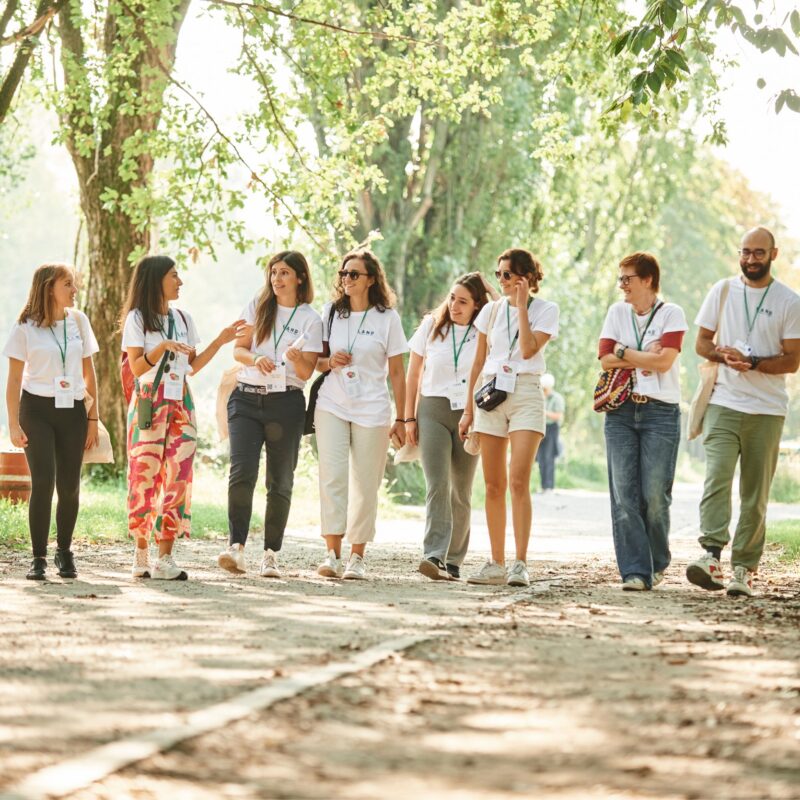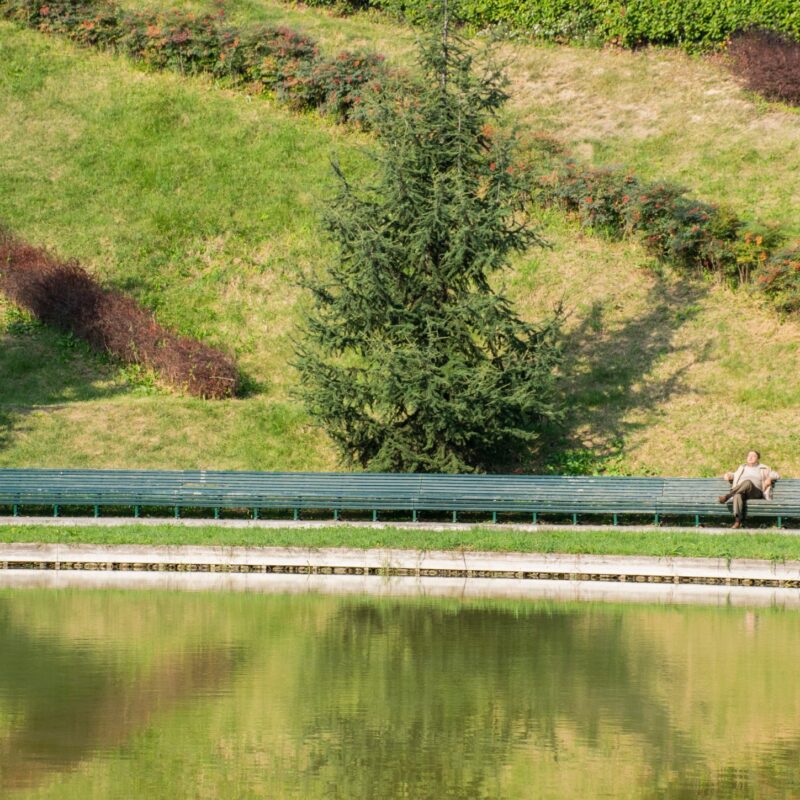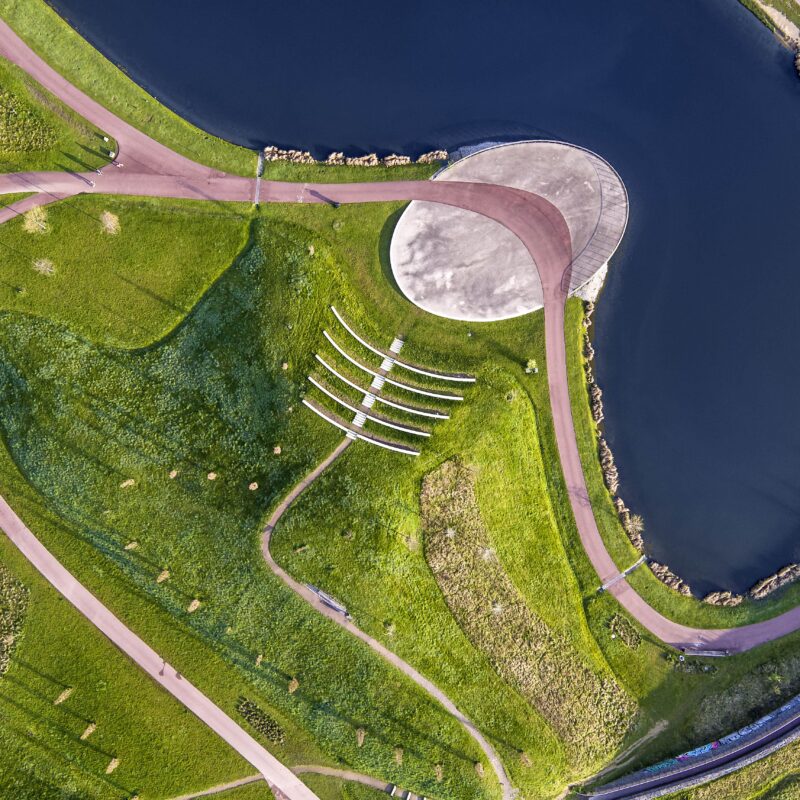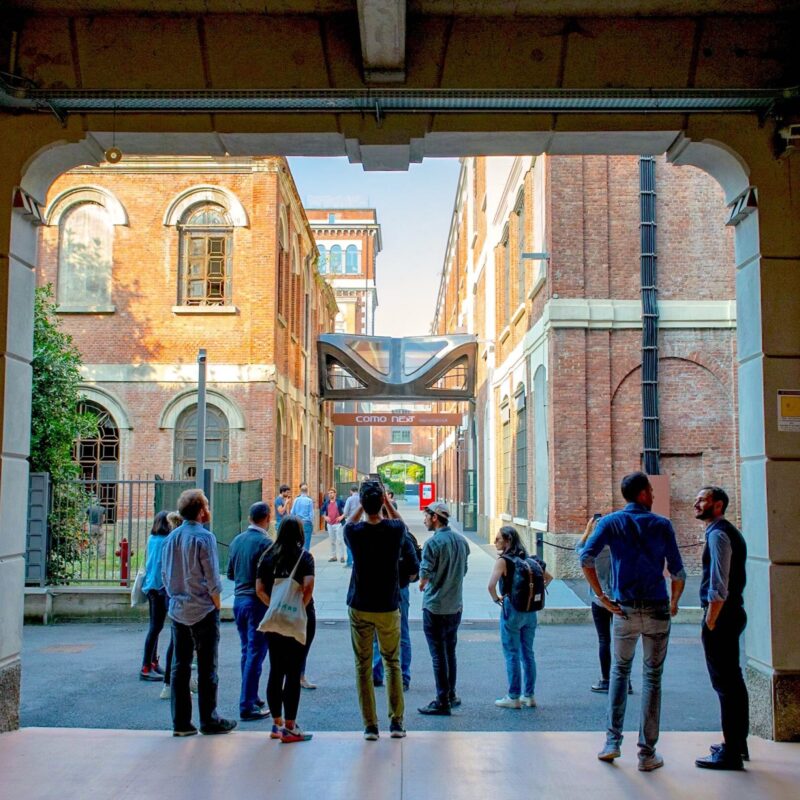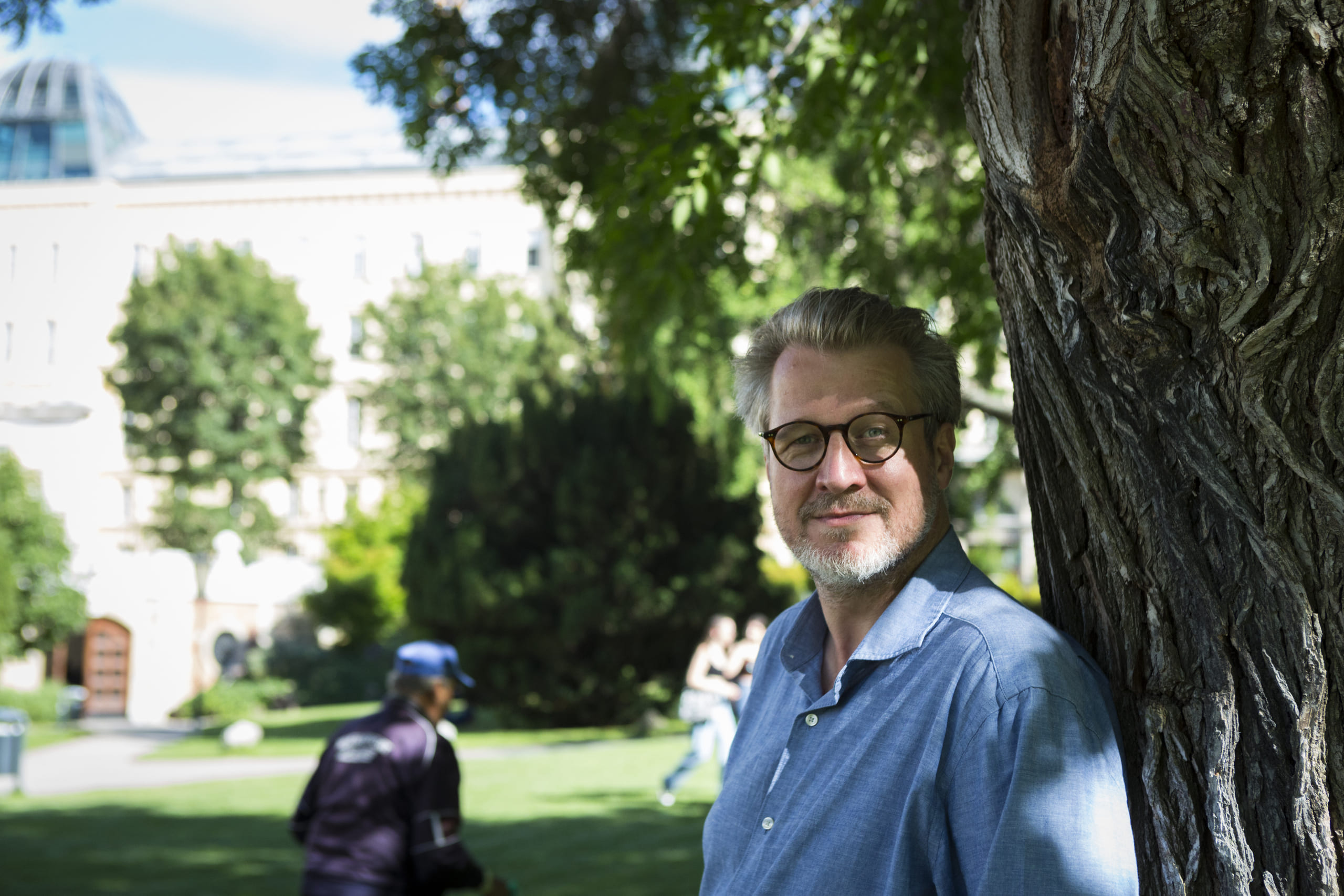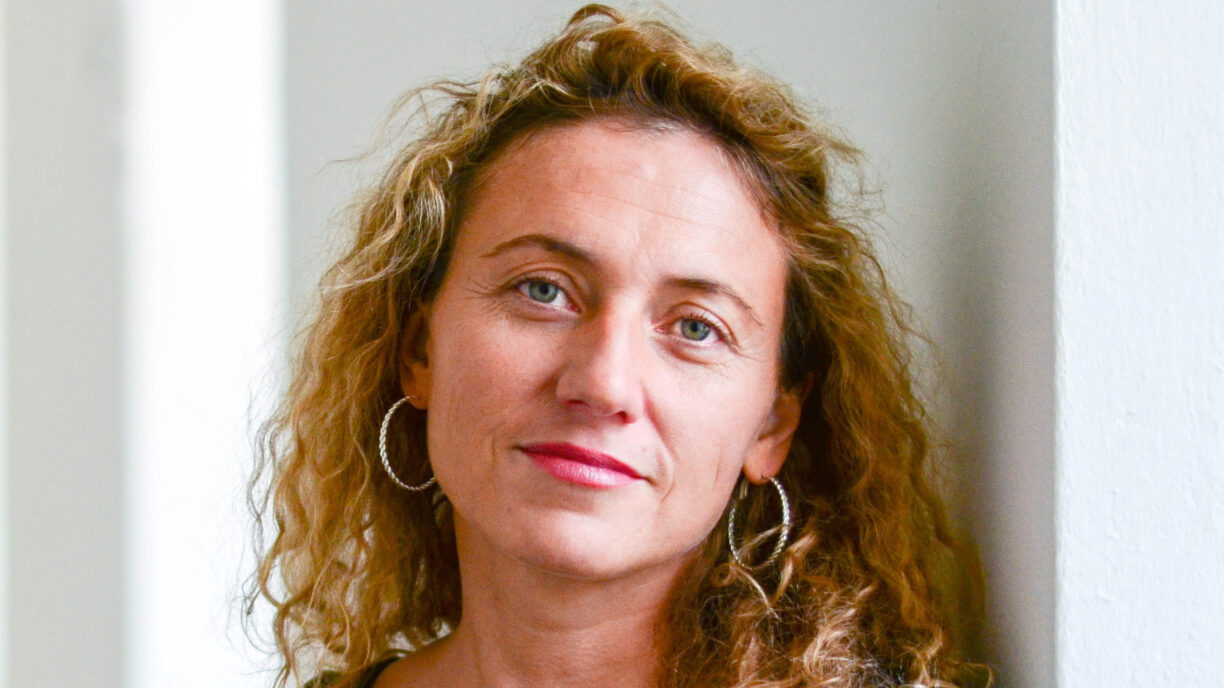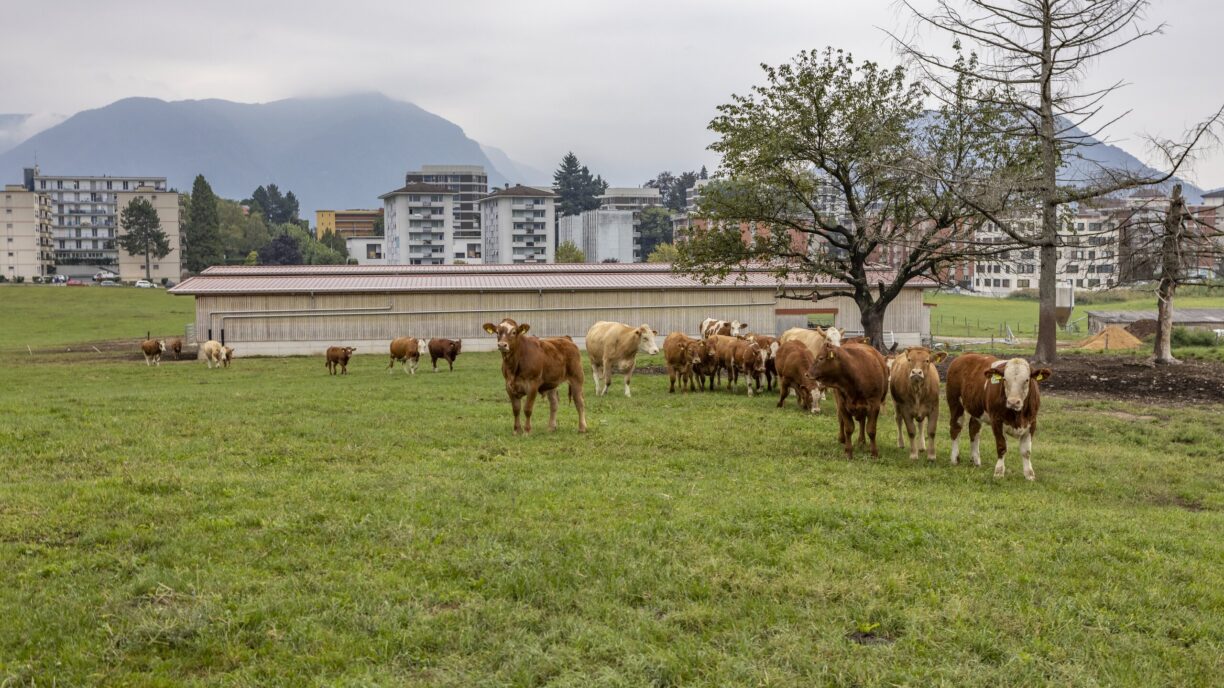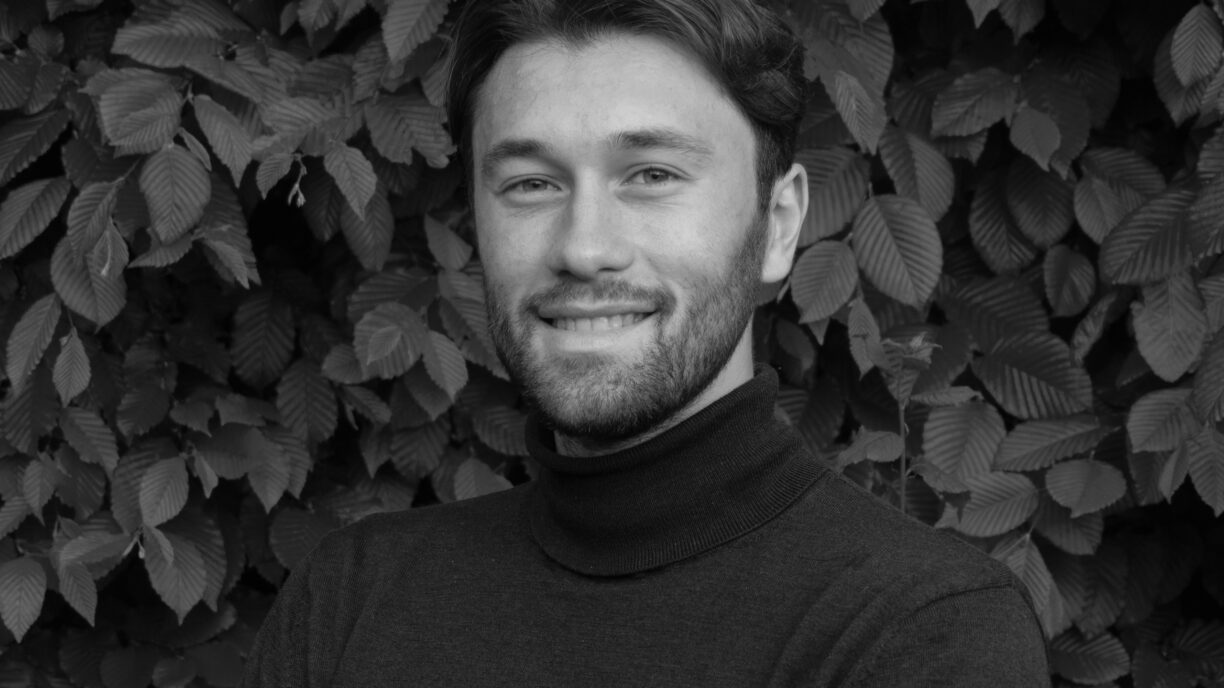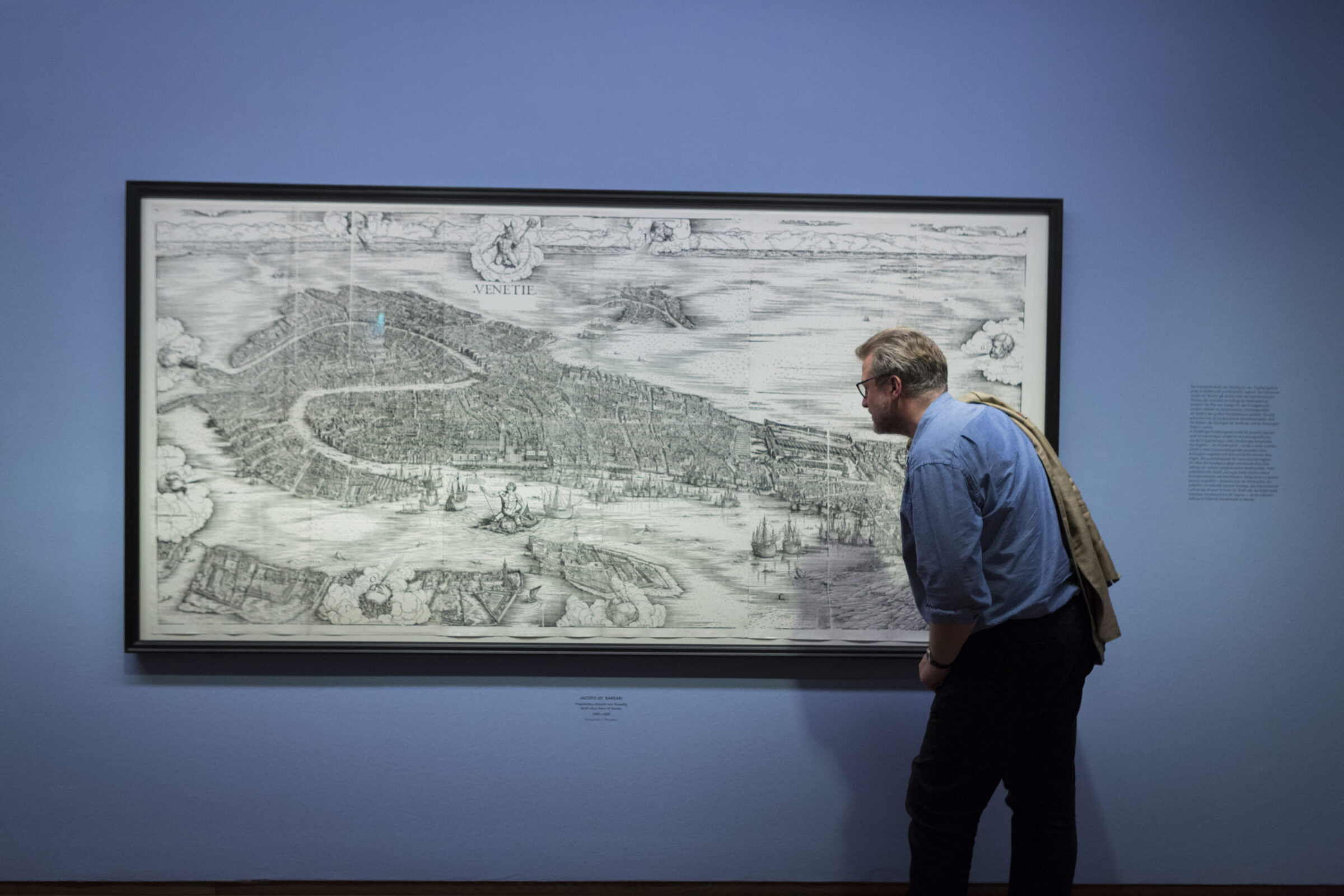
Man, Nature and Landscape
An Absurdly Inflated Sense of Self Difficult Connections, Conflict-Ridden Relationships: Man, Nature and Landscape
A conversation with Philipp Blom.
According to an analysis published in “Nature” magazine (Dec. 2020), the mass of man-made things exceeds the mass of natural things (biomass). Are we suffocating ourselves? What effect does this have on the relationship between man and nature? Are we now imprinting our understanding of nature on the landscape? Can nature become an antidote to a digitally alienated world?
These questions are presented in a conversation with the historian and essayist Philipp Blom. Born in Hamburg in 1970, he studied philosophy, history and Jewish studies in Vienna and Oxford, and now lives in Vienna.
Questions to Philipp Blom:
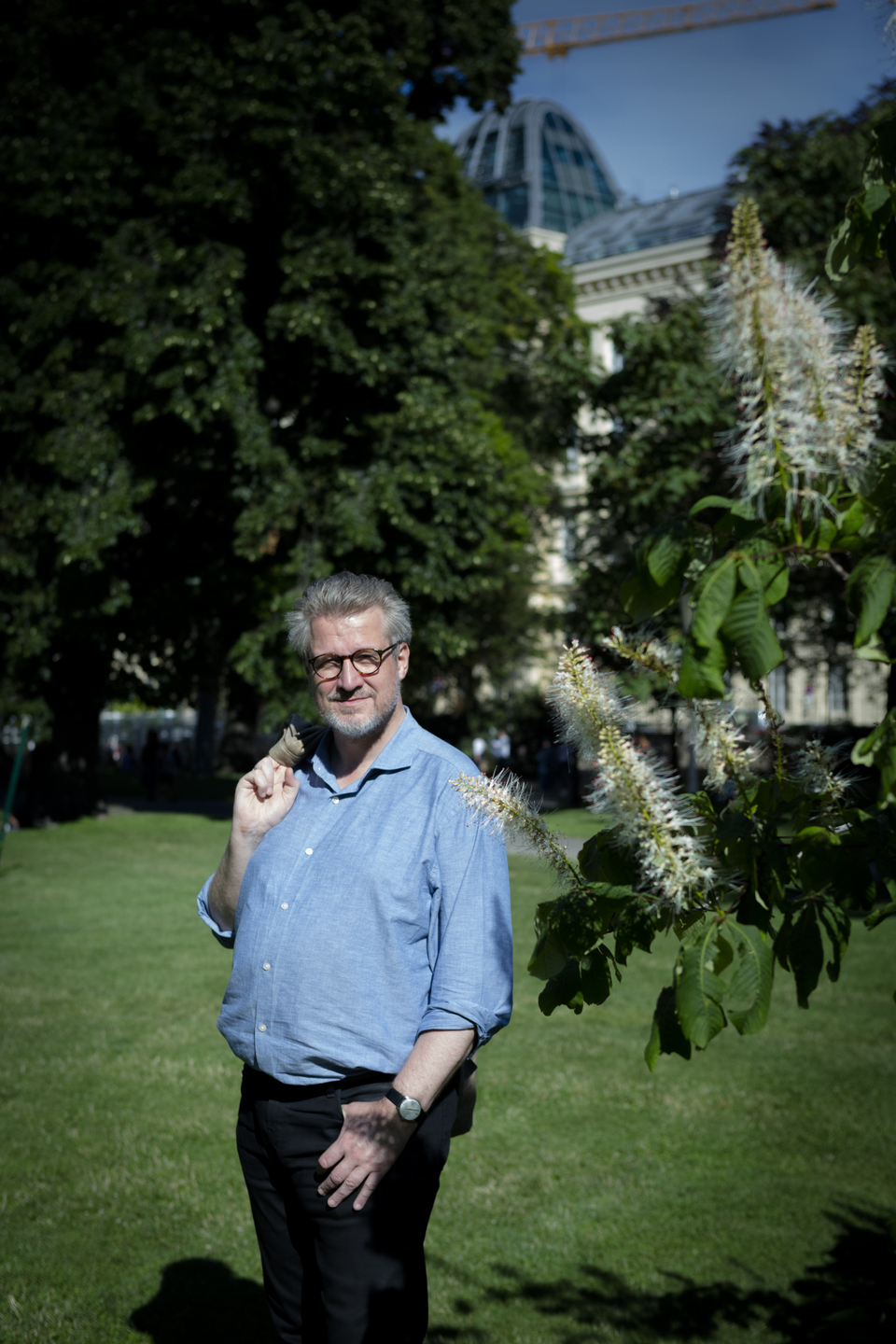
Philipp Blom © LAND, Photo by Sabine Biedermann
Landscape is a broad field in the truest sense of the word – where would you begin?
In a discussion of landscape, what’s important to me is this: I believe we’ve reached the end of 3000 years of cultural history. We’ve reached the end of this epoch that began with the idea of subduing the earth. That was already a concept: it wasn’t just from the Bible, but this idea that we’re outside and above nature is coming to an end as a result of climate catastrophe. We see that it’s empirically false. And we see that our old explanations are less and less in line with reality.
Can you say something about the relationship between man and earth, man and nature?
This already throws us into the language trap. To depict man and nature as two different things is manifestly wrong. What interests me about the biblical phrase is that it constructs a relationship that in its time was an absolutely mythic atom bomb. What did our neighbors think, at the time the Bible was written? Let’s take the Greeks. Before they set sail, they had to make sacrifices to Poseidon so he would show them favor. All deities, all furies, demons, spirits, nymphs etc. represent the forces of nature, they have their own intentions and they interact with people. Sometimes through rape or abduction, sometimes by doing good things. But it’s an understanding of the enduring interaction with the forces of nature. And an understanding of the fact that this nature has power and can exert its power over our lives, and that we have to come to terms with these natural forces, in which everything is animated. And then the Bible arrives and turns them into dead matter in a very patriarchal way. So nature is dead dust, it can be possessed, bought, sold, plowed, penetrated, it has nothing to say, it has no interest, no energy, no power. This is the relationship we’ve pursued.
Pursued in a sort of hubris?
Everything that we create is nature, is evolution. The problem lies partly in thought but also partly in semantics. So we can talk about spirit as if it could exist separate from the body. So we can talk about there being man and nature as if it were a contradiction. And we can rise above and out of this nature and look down at it from the outside. It’s very seductive, it’s naturally also very flattering to us as a species, but it‘s intellectually very destructive. Epistemologically very destructive, because we are simply creating a false contra- diction and giving ourselves an undue sense of grandeur. We are part of a gigantic and complex system, a seemingly unimportant part of it, not even as important as fungi or algae or plankton. But we construe ourselves as not only an equal partner, but actually the ruler of all.
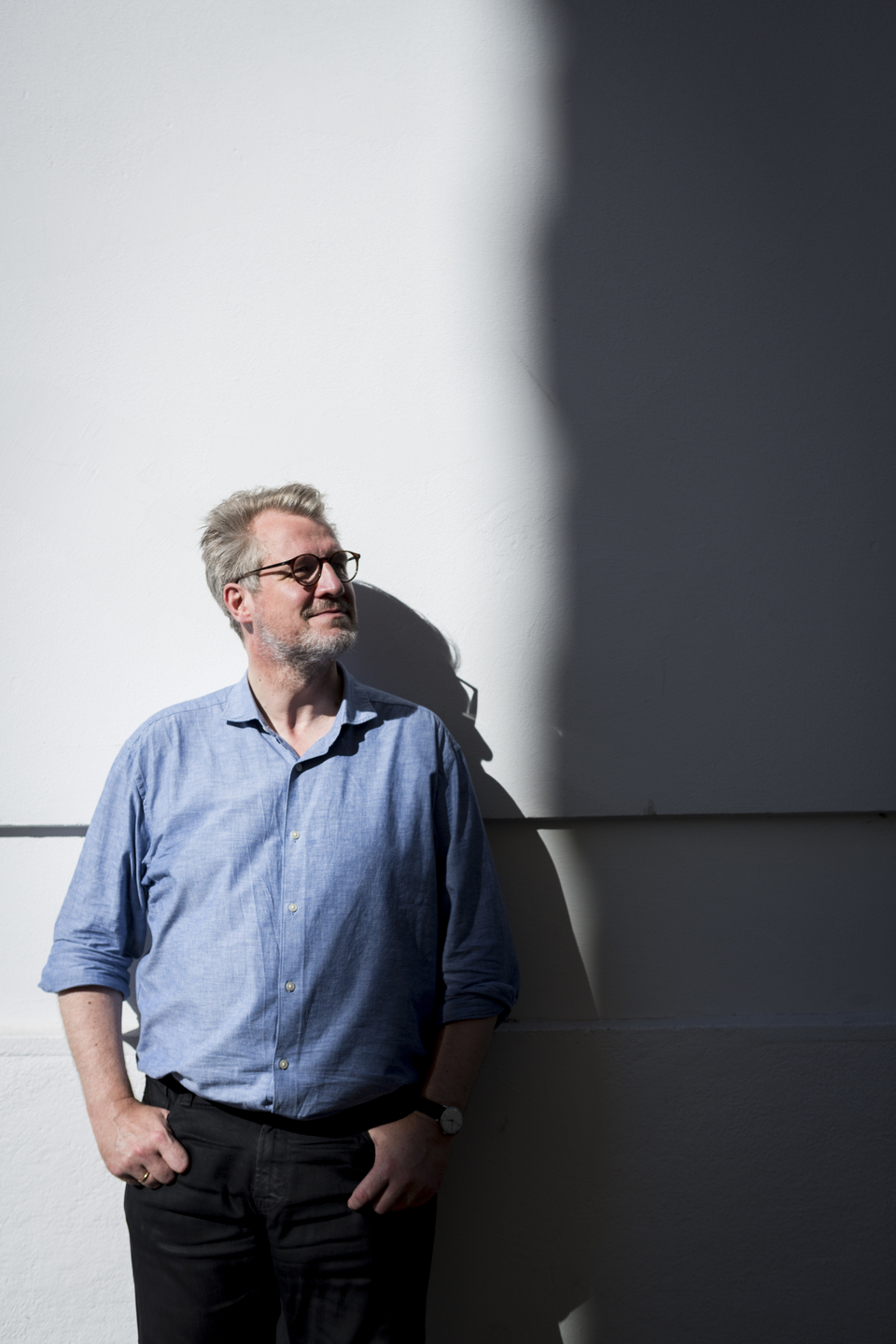
Philipp Blom © LAND, Photo by Sabine Biedermann
And that complex system is now blowing up in our face.
It’s blowing up in our face, but it’s so baked into our thought structure and speech, into our entire cultural experience, that it becomes incredibly difficult for us to break free of it. But that’s exactly the challenge we now face. That’s why this topic is so fascinating to me, because landscape is right in the middle of it. Sometimes landscape also plays with wildness, with the feral. English landscapes like to do that, French landscapes or French gardens try to do the exact opposite. Even the concept of landscape – where is the wildness, where does it begin, where is dominance achieved? Those are questions that are incredibly relevant right now.
How are nature and landscape related?
Landscape is always a construct. When working on my Italy book (*), it became clear to me that before the eighteenth century, before Rousseau, the Alps weren’t beautiful, they weren’t sublime, and they weren’t primordial, they were a death zone, they were like the Sahara. People tried to get over them fast, and not everyone made it. There were not yet any carriageways. This idea that landscape is sublime, primordial, that it connects us to something, that is of course an idea of alienation. That’s an idea that comes from the contradiction that we no longer live in the landscape and through the landscape or on the land and through the land, but rather that the landscape has become an object of aesthetic admiration and of course also an object of aesthetic construction. Sure, there are watercolor sketches by Altdorfer and Dürer that show what they actually saw during their travels. But of course, the vast majority of landscapes were created in the studio and were allegorical and did not depict an actual piece of land, but rather a universal landscape with a river, mountains, and a city and all features required to depict the wholeness of the world – never a realistic landscape. And as time went by, people began to believe that this was a true depiction of nature. Which always included people, so nature without people obviously made no sense, it wasn’t worthy of note. That first changed with the Romantic period, though even Caspar David Friedrich often paints people – at least from behind. But the idea of landscape breaking free from being an object of aesthetic admiration, that came very late. And with it a feeling of superiority on one hand and loss on the other.
So does it have to do with caring about nature?
No, it’s about a much more radical humility. We’re not a particularly important animal in this gigantic system. It’s not dependent on us, but rather we on it. We’re not good shepherds who tend nature and can do things and control them. We’re dependent on nature, and these systems are so complex that we’ve barely begun to grasp and comprehend one or two percent of their complexity. Which is why geoengineering is such an absurd idea. How can we intervene in systems whose complexity we absolutely cannot comprehend, in terms of either space or time? The idea of ‘subduing the earth’ has become a shallow concept that’s resulted in an ever-growing global market, a dogma of eternal growth, eternal control and domination. And we’ve reached our limits. We live in a world in which enough rain forest to fill 30 football fields is destroyed every minute, and it’s obvious that this cannot go on for even one decade more. We’re not destroying nature, which in 300,000 years will look wonderful again, except for ourselves. But we’re changing systems in ways that make it impossible for us to live in them anymore. Our greatest challenge – and it is actually an evolutionary challenge, an existential challenge – is to come to a completely new understanding of our place in this complex whole.
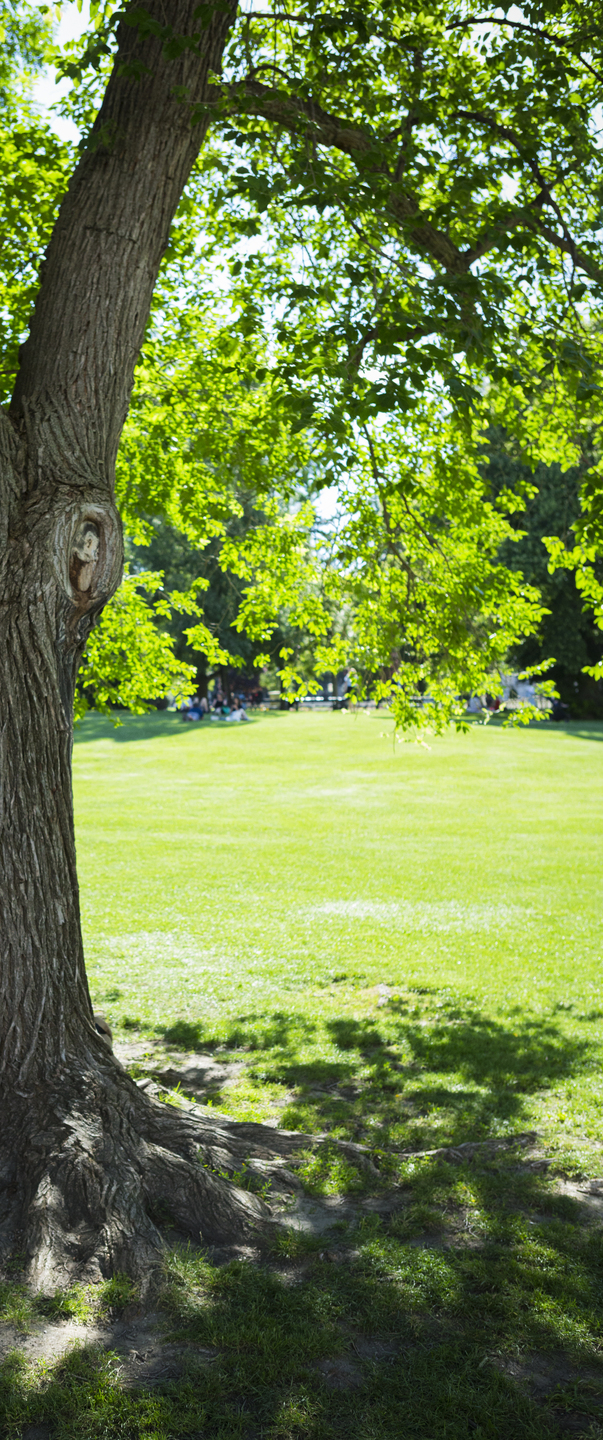
Philipp Blom © LAND, Photo by Sabine Biedermann
Is today’s increased longing for nature also an antidote to the digital world?
It’s clear that anyone who interacts with nature, who ventures a little bit away from very artificial surroundings, can begin to feel it within themselves. Simply put, an environment that speaks to and soothes our evolutionary experience makes us feel more in tune with our surroundings and ourselves than an environment that does not. Here as well, we are victims of a rapidly accelerating history. I think we are seriously underestimating the psychological effect on us of the digital world. The digital world is rule-bound. Maybe the algorithm’s built-in random generator does something interesting once in a while, but the digital world basically makes us unfit for the outside world. Because the outside world is neither fair nor meaningful, it’s haphazard, and we’ve got to learn to improvise in order to deal with it. I think this is something that people who live from and on the land experience daily. Because something is always happening, a hailstorm comes through and destroys the harvest, or the harvest is especially abundant, animals suddenly appear, things happen all the time that can’t be calculated. Hence the desire to return to natural environments. It may start with a potted plant, an experience of growth and the self-organization of nature, and leads to the clear connection between us and nature.
Can you say anything at least to soften this sense of alienation?
We only share 20 percent of our DNA with trees, yet this 20 percent also produces common goals that result in a symbiotic community. I don’t think that’s mysticism. This alienation you’re talking about has a very high cost, some of which we can afford, because we’ve grown rich by creating this alienation. But it also creates a lasting malaise, which we can partially compensate for by sublimating nature into landscape and making it our own, creating it according to our own criteria. Like a universal landscape that does not reflect any existing part of the land, but is rather a projection of what the ideal land should be. But I believe that the landscape we’ve constructed is a product of this alienation, a very beautiful product of this alienation. And we’ll never be fully free of this alienation. There’s no going back to the trees, there is absolutely no going back in history. The model we’ve successfully used for hundreds of years to dominate and loot the world is now collapsing around us. And we still haven’t figured out how to deal with it.
Is it possible to live intelligently with nature?
My point is, I believe that what we understand as landscape comes from this outsider perspective that we’ve assumed. And which, I might add, has been an unprecedented success, without which we would have had no science, no democracies, no human rights. And to some extent these are luxuries. It’s no coincidence that democracies in the true sense of the word are all products of the post-war period and the oil boom. The question is how we can come to a new understanding of the relationship between us and the rest of nature. That, I believe, is a great challenge. We’re just beginning to glimpse the vague outlines of how it could be if we could give up this absurdly inflated sense of ourselves. And that impacts the very foundations of our understanding of ourselves as humans. Then there won’t be landscape any more, just land.
Interview (in Vienna on June 21, 2021) by Henning Klüver.
Our greatest challenge is to come to a completely new understanding of our place in this complex whole.
Read other Articles from this Edition
